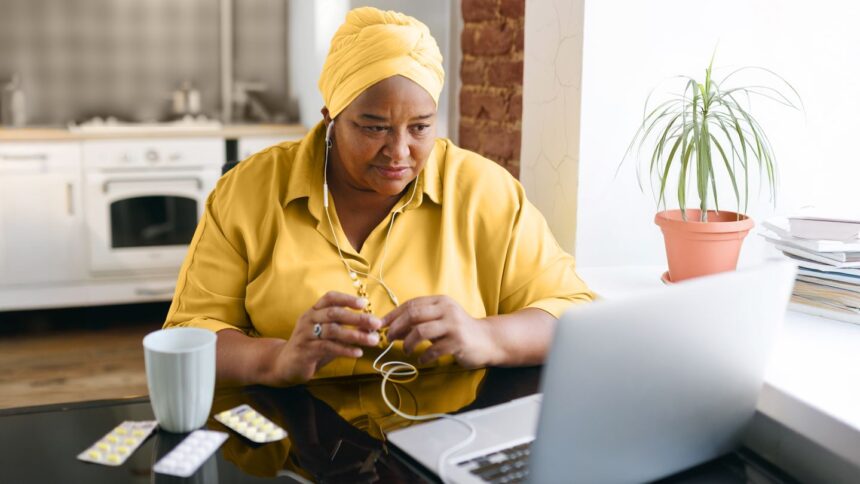This content material initially appeared on On a regular basis Well being. Republished with permission.
By Maggie Aime, MSN, RN
Medically Reviewed by Nimit Sudan, MD
When you’ve been identified with most cancers and you’ve got diabetes, it is best to know that most cancers therapies can have a powerful impact in your blood sugar. It may be difficult to navigate the 2 situations on the similar time.
“Individuals with diabetes present process most cancers therapy might face particular challenges and potential issues because of the interplay between their diabetes and most cancers therapies,” says Chevon Rariy, MD, an endocrinologist and the chief well being officer of Oncology Care Companions.
About 1 in 6 individuals with most cancers even have diabetes.[1] Sadly, diabetes is related to worse most cancers outcomes, together with extra hospital stays, extra infections, and a decrease survival charge.[2] This text will define how these two situations and their therapies work together and what you’ll be able to count on.
Most cancers Therapies Can Have an effect on Blood Sugar Administration
There are lots of various kinds of most cancers therapy, and a number of other of them are identified to immediately have an effect on blood sugar ranges.
Steroids
Steroids, which are sometimes administered alongside chemotherapy, are a serious reason for hyperglycemia (excessive blood sugar) throughout most cancers therapy. Oncologists prescribe steroids to scale back chemotherapy unwanted effects like fatigue and nausea, to guard a weakened immune system, or to deal with the most cancers itself.[3]
Steroids, together with corticosteroids and glucocorticoids, can immediately spike blood sugar ranges in individuals each with and with out diabetes. This impact is so potent that in some circumstances steroids may even trigger individuals to develop kind 2 diabetes.[4] When you’re utilizing steroids, chances are you’ll must dramatically improve the quantity of glucose-lowering remedy that you simply use. Many sufferers are prescribed insulin to handle steroid-induced hyperglycemia and might want to measure their blood sugar extra continuously.[5]
Chemotherapy
Some chemotherapy drugs also can trigger hyperglycemia. Dr. Rariy says that this occurs when chemo medication result in dehydration and electrolyte imbalances — too little or an excessive amount of sodium, potassium, chloride, or calcium within the blood and different bodily fluids.[6] Dehydration and electrolyte imbalances intrude with the physique’s capability to control glucose ranges, resulting in blood sugar spikes.[7]
Hyperglycemia is usually a results of frequent unwanted effects of chemotherapy equivalent to nausea, vomiting, or diarrhea. If sufferers can not eat or drink usually, it will probably make blood sugar administration much more difficult, particularly for individuals who use insulin each time they eat.
Rariy identifies the next chemotherapy medication as dangers for hyperglycemia:
- carboplatin (Paraplatin)
- cisplatin (Platinol)[8]
- oxaliplatin (Eloxatin)[9]
- paclitaxel (Taxol)[10]
Focused Remedy and Immunotherapy
Focused remedy differs from chemotherapy. Whereas chemotherapy assaults all cells that divide quickly (together with wholesome ones), focused remedy assaults solely the most cancers cells, stopping them from multiplying and spreading. Rariy says that sure focused therapies, equivalent to bortezomib (Velcade), used to deal with a number of myeloma and sure lymphomas, can each decrease and lift blood sugar ranges.[11]
Equally, some immunotherapy medication would possibly affect blood glucose ranges. These drugs, together with pembrolizumab (Keytruda) and nivolumab (Opdivo), are identified to trigger hyperglycemia in individuals who have already got diabetes.[12]
Most cancers Therapy and Diabetes Problems
Most cancers therapies can work together with different points of diabetes past blood sugar administration.
Infections
“Diabetes can weaken the immune system, and sure most cancers therapies, equivalent to chemotherapy, additionally weaken the immune system,” says Rariy.
Individuals with diabetes are already at increased danger for some frequent infections, like pores and skin infections, fungal infections, and pneumonia.[13] This impact might be magnified by most cancers therapies like chemotherapy, which additionally generally weaken the immune system, leaving sufferers particularly susceptible to infections.[14] In individuals with diabetes, infections can result in harmful penalties, together with toe, foot, or leg amputation.
Radiation remedy also can improve the chance of an infection. Exterior beam radiation entails aiming tumor-destroying radiation beams at cancerous cells inside the physique. The beam passes by the pores and skin, doubtlessly altering or burning it. Weakening the pores and skin barrier introduces a better danger of pores and skin ulcers from radiation, Rariy says. Individuals with diabetes typically have gradual wound therapeutic as a result of poor blood circulation or nerve harm, which makes the pores and skin much more more likely to break down.[15]
Most cancers therapies also can worsen the long-term issues of diabetes in these methods:
- Each diabetes and sure most cancers therapies can result in nerve harm (neuropathy).[16] These two elements, when mixed, can lead to elevated neuropathy signs like ache, numbness, tingling, and may make every day actions difficult, Rariy says.
- Sure anticancer drugs also can have damaging results on the center, referred to as cardiotoxicity.[17] Individuals with diabetes already carry an elevated danger of heart problems. “The mixture of each situations might proceed to raise the chance of heart-related issues,” Rariy says.
Diabetes Can Intervene With Most cancers Therapy
Your medical doctors may have to regulate your most cancers therapy to account to your diabetes. “In some circumstances, healthcare suppliers would possibly go for different chemotherapy brokers which have much less affect on blood sugar ranges or select regimens which might be much less more likely to exacerbate diabetes-related issues,” Rariy says.
Generally, your healthcare supplier might unfold out your most cancers therapy to provide your physique additional time to get well, provides Rariy. As an alternative of administering one massive dose of steroid, your oncologist might break it down into a number of small doses. Steroids will also be delivered slowly over an prolonged time through an intravenous (IV) tube. This gradual absorption reduces the chance of accelerating your blood glucose.[18]
Blood sugar administration issues might necessitate delays in your most cancers therapy. For instance, should you expertise persistent excessive blood sugar ranges whereas present process most cancers therapy, your oncologist might pause therapy till your blood glucose is best managed, Rariy says. This might assist keep away from additional issues, however your healthcare group must strike a steadiness in order that there isn’t a detrimental affect in your most cancers prognosis.
Your healthcare suppliers ought to make the most of a team-based method to make sure that most cancers and diabetes-related issues are dealt with immediately to keep away from issues, says Rariy. Recommendation from a number of specialists, equivalent to oncologists, endocrinologists, nurses, and different healthcare professionals, is usually wanted.
Tips on how to Handle Your Diabetes Throughout Most cancers Therapy
Your diabetes therapies may have changes throughout most cancers therapy. Particularly, chances are you’ll want new drugs to assist management your blood sugar in case your most cancers therapy is resulting in hyperglycemia, probably together with insulin injections, Rariy says.
Working collectively along with your healthcare suppliers is necessary when coping with diabetes throughout most cancers therapy. Good diabetes administration will help forestall issues and interruptions in your therapy. Right here are some things to be aware of.
- Schedule a go to along with your endocrinologist. Chhaya Makhija, MD, an endocrinologist in personal apply in California, says to see your endocrinologist even earlier than beginning most cancers therapy. Your endocrinologist will help alter your diabetes drugs or insulin doses to make sure your blood sugar stays well-controlled throughout most cancers therapy.
- Preserve your oncology group up to date. Ensure your oncology care group is totally conscious of all of the diabetes drugs you are taking. Inform them in case your diabetes drugs change or should you discover any adjustments in your signs.
- Preserve an in depth watch in your blood sugar. Your care group might ask you to observe your blood sugar ranges extra carefully, says Dr. Makhija. Ask how typically it is best to verify your blood sugar all through most cancers therapy. Preserve a file of your blood sugar ranges and notify your healthcare suppliers about any uncommon excessive or low readings.
- Be careful for diabetes warning indicators. Look ahead to cues that your diabetes administration wants consideration. These embrace sudden blood glucose spikes, elevated nerve ache or numbness, blurry imaginative and prescient, feeling extraordinarily drained or thirsty, and frequent urination. Notify your oncologist or endocrinologist immediately should you discover these signs.
- Eat wholesome meals. Makhija recommends working with an oncology dietitian and diabetes educator to assist information you. Your oncologist or nurse can refer you to a dietitian. “Keep away from processed meals and high-fat meals,” Makhija recommends. Ask about diet shakes and do-it-yourself plant-based recipes which might be decrease in sugar and easy carbohydrates and better in different vitamins and protein, she provides.
- Keep lively and prioritize wholesome sleep. Don’t neglect in regards to the significance of staying lively and sleeping properly, Makhija says. “[These] assist with each glucose management and unwanted effects of most cancers remedy,” she provides. Interact in bodily exercise as tolerated.
- Apply stress administration. Stress, which spikes the degrees of cortisol and different glucose-raising hormones, can drive excessive blood sugar. It might not be simple to remain relaxed throughout most cancers therapy, nevertheless it’s price attempting. Rariy recommends practising self-care and making your well-being a precedence.
The Takeaway
- Some most cancers therapies, together with chemotherapy and steroid therapies, could cause excessive blood sugar ranges.
- When you have diabetes and most cancers, your care group might need to gradual or alter your most cancers therapy so as to cut back the chance of diabetes administration points.
- Diabetes might worsen some most cancers therapy unwanted effects, equivalent to the chance of infections. Others, equivalent to dehydration, might make it tougher to regulate your blood sugar.
- Your diabetes administration might develop into particularly complicated throughout most cancers therapy, requiring new drugs and additional glucose monitoring. Navigating the 2 situations concurrently requires the cooperation of a group of healthcare professionals.










